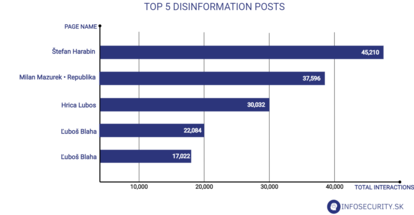Disinformation
Cheap rhetorical tricks and recycled narratives: Are disinformation actors running out of ideas?

Disinformation narratives concerning the energy crisis took a back seat; the go-to topics for disinformation actors over the past two weeks were NATO and Russia, Polexit, “traditional values” and the ever-present COVID-19 pandemic.
Infosecurity.sk presents an overview of disinformation trends that have been on the rise in the information space in the past two weeks:
- Local Slovak pro-Kremlin outlets introduced a misleading narrative portraying Russia as a besieged fortress that is constantly threatened by aggressive NATO exercises as well as fictitious redeployments of troops close to Russia's borders.
- We have detected several disinformation narratives concerning "traditional" values and the rights of same-sex couples. The purpose of these narratives was to create a false impression that the Western liberal value system based on tolerance and inclusivity will inevitably lead the Slovak society into a moral decline.
- Regarding the ongoing energy crisis, the local disinformation media continue to spread systematic pro-Kremlin disinformation, through which they create an impression that the EU's Green Deal was an ill-considered and hasty decision and is to be blamed for the crisis.
- Local disinformation actors are taking advantage of the recent disagreement between Poland and the EU and the subsequent rumours about the so-called "Polexit". The case is being used to harm the image of the EU, undermine its cohesion, and push forth talks about Slovakia's exit from the EU.
- Disinformation actors continue to spread COVID-19 related disinformation. Frequent were narratives about discrimination, segregation, and dehumanization of the unvaccinated, as well as the division of citizens to subhuman and superhuman.
Recycled anti-NATO disinformation narratives
The go-to topic of disinformation actors over the past two weeks have been NATO's relations with Russia. Given Moscow's recent espionage affair, the closure of its mission at NATO in retaliation, and the general low point in relations between Russia and NATO, this hardly comes as a surprise.
Even less surprising is the repertoire of disinformation narratives used to slander NATO, consisting primarily of cheap rhetorical tricks and old recycled narratives that rely heavily on the victimhood card.
Russian Defence Minister Sergei Shoigu's critical reaction to NATO's new concept of deterrence and defence in the Euro-Atlantic area was repeatedly quoted. Although the concept is defensive in its nature, the disinformation media interpret it as a "plan for war against Russia." The pro-Russian media also quoted Shoigu's statements that NATO was moving its troops towards Russia's borders.
Another Russian statesman frequently quoted was Putin's spokesman, Dmitry Peskov, specifically with respect to his comments on Moscow's decision to suspend the Permanent Mission of the Russian Federation to NATO. The article stated that "Russia has always been in favor of developing relations with the North Atlantic Alliance, despite the aggression of the military-political bloc, but all efforts have been in vain."
The disinformation outlets thus introduce a misleading narrative portraying Russia as a besieged fortress that is constantly threatened by aggressive NATO exercises as well as by fictitious redeployments of troops to Russia's borders. However, there was also no shortage of articles describing the superiority of the Russian armed forces over the US and NATO.
Perhaps the most interesting is the inner contradiction of these disinformation narratives. On the one hand, the pro-Russian websites portray the US and NATO as aggressors who pose an imminent threat to Russia, but on the other hand, they simultaneously describe them as weak and unable to match Russia’s strength. So, according to the disinformation media, the aggressive but weak NATO pose an imminent threat to the peaceful, defensive but militarily stronger Russia.
Russia as a protector of “traditional values”
The disinformation media frequently quoted also Vladimir Putin's speech to the Valdai Discussion Club in Sochi last week. Putin heavily criticized the West on gender equality and the rights of same-sex couples. In his speech, Putin said that the upbringing of children in Western countries was "perverse".
He also specifically criticized the West for introducing terms such as "parent number 1" and "parent number 2." These, the Russian president said, were on the verge of being a "crime against humanity" and posed a threat to "traditional values".
Putin's remarks resonated strongly with the local disinformation actors and were, therefore, immediately picked up and further disseminated by the leading pro-Kremlin websites in Slovakia, including Hlavný denník, Hlavné správy and ExtraPlus.
The issue of the rights of same-sex couples seems to be an extremely polarizing topic in Slovakia. The country is currently one of the last member states of the European Union that does not allow same-sex marriages or partnerships. Data from Rainbow Europe's European LGBTQ Index also highlight the fact that Slovakia is at the bottom of the EU in terms of tolerance towards the LGBTQ community.
The narrative of "threatened values" is, therefore, a common tool used by local pro-Russian websites to spread disinformation, not only because of its strong emotional charge, but also because it can be easily modified for different audiences.
The purpose of this narrative is to appeal to the negative emotions of the public and to create the false impression that the Western liberal values will inevitably bring Slovak society into moral decline, leading to sexual deviance and the decay of “traditional” femininity and masculinity, while Russia is portrayed as the defender of the said ”traditional values”.
Disinformation narratives concerning "traditional" values and the rights of same-sex couples are thus a cheap and effective cognitive weapon for Moscow and its local proxies to polarize society and undermine public trust in the EU and pro-Western politicians. Slovak President Zuzana Čaputová has been a frequent target of such disinformation due to her pro-LGBTQ stance.
From green deal to green “hell”
Although disinformation narratives concerning the ongoing energy crisis took a back seat in the past two weeks, that doesn’t mean they disappeared completely. Local disinformation media continue to spread systematic pro-Kremlin disinformation within this topic.
The disinformation actors are actively undermining the EU's plans to diversify its energy sources with a clear objective to create an impression that the Green Deal (portrayed as green “hell”) was an ill-considered and hasty decision and is to be blamed for the ongoing energy crisis. The same applies to EU itself.
The diversification of energy sources, as well as EU's reorientation towards green energy sources, would weaken the power of Russian influence in Europe - a fact which the pro-Kremlin media are trying to hide from the public by utilising the aforementioned narrative.
Poland on a crash course with the EU?
Local disinformation actors are also taking advantage of the recent disagreement between Poland and the EU and the subsequent rumours about the so-called "Polexit".
This narrative began to circulate on the Internet after the Polish Constitutional Court recently ruled that two points of the EU treaty were inconsistent with the Polish constitution. Local disinformation actors portray the ruling as an evidence that the EU is an unstable organisation that seeks to take away the sovereignty of its member states.
Even though Poland leaving the EU is a highly improbable scenario, Polexit is being used by local far-right politicians like Milan Uhrík and Milan Mazurek to push talks about Slovakia leaving the EU.
Clinging to COVID-19
COVID-19 narratives have formed the backbone of disinformation content disseminated in the Slovak information space for a long time. Over the past two weeks, local disinformation actors have continued to spread toxic rhetoric regarding the pandemic measures, drawing parallels to apartheid, totalitarianism, and fascist rule.
Frequent narratives include discrimination, segregation, and dehumanization of the unvaccinated, as well as the categorization of citizens as subhuman and superhuman. Vaccines were portrayed as ineffective and experimental. Negative emotions were widely spread by disinformation actors creating the impression that the majority of the population would lose its human rights if it did not resist vaccines and the government´s measures.
The graph below shows the top 5 Facebook posts by disinformation actors (in terms of the total number of likes, comments and shares) over the past two weeks.

The most resonating was a video posted by Štefan Harabin, the former head of the Supreme Court of the Slovak Republic and currently a one of the leading disseminators of problematic content.
The video was recorded during a court hearing with the editor-in-chief of the disinformation website Zem a Vek, Tibor Rostas, who was found guilty of defamation of race and nation. In the video, Harabin criticizes the pandemic restrictions and refuses to wear a mask in the court despite a warning from the police.
Disinformation narratives criticizing the pandemic restrictions are also spread in the second most popular video, posted by Milan Mazurek. The third most popular post undermined the effectiveness of vaccines. The post was published by Luboš Hrica - a Slovak blogger known for regularly spreading disinformation narratives.
The last two posts are a video and a post by far left politician Luboš Blaha touching on a range of topics, criticizing, among other things, the ruling coalition and the "mainstream" media.
The data was collected via the analytical tool CrowdTangle.[1]
Project Infosecurity.sk organised by STRATPOL – Strategic Policy Institute and Slovak Security Policy Institute, which is supported by the Prague office of the Friedrich Naumann Foundation for Freedom, continuously monitors the activities of both Slovak and foreign disinformation actors, but focuses mainly on the former. The project activities are built upon daily monitoring of emerging disinformation, hoaxes, and conspiracy theories in the online information space. This approach allows the analysts to identify disinformation posts and narratives that resonated with the public the most, as well as to find out where they originated, and how they spread and evolved on social media. The report takes the form of a bi-weekly summary of arising trends in the spread of malicious information content online. Based on that, Infosecurity.sk can warn the public about emerging and current trends in the field of disinformation, manipulation, and propaganda.
[1] CrowdTangle is a monitoring tool made available by Facebook to help monitor, analyse, and report on what’s happening across the platform. https://www.crowdtangle.com
Matej Spišák is a Research Fellow at STRATPOL – Strategic Policy Institute in Bratislava and Editor-in-Chief at Infosecurity.sk.
Denis Takács is an Analyst at STRATPOL – Strategic Policy Institute in Bratislava.

